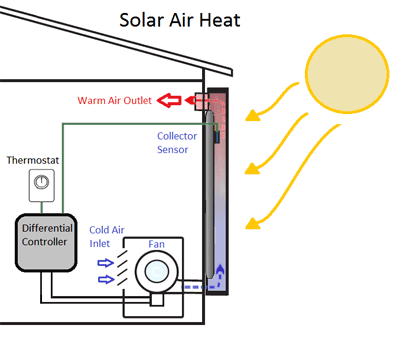The Rural Renewable Energy Alliance (RREAL) on the Hunt Utilities Group Research campus in Pine River, Minnesota, has been working to address energy poverty for over a decade. It runs a statewide Solar Assistance program that is supported by RREAL’s solar installation and design services in an effort to make renewable energy accessible to everyone.
To address energy poverty, RREAL has partnered its Solar Assistance program with nine Minnesota Community Action Agencies to help low-income residents to reduce their energy bills. The Solar Assistance program provides homeowners with solar powered furnaces (SPFs) that can be attached to the sides of eligible houses to give residents a source of heat that saves them from the high cost of conventional fuels. RREAL follows the same guidelines as Federal Assistance (LIHEAP) when assessing a household’s need for assistance. A household is eligible for energy assistance if it earns 50% or less of the median state income. As an example, the 2012-2013 estimated median income of a four person Minnesota household was listed as $85,577 in the LIHEAP Clearinghouse. This household would have to earn $42,789 or less a year in order to be eligible for assistance.
By adding a SPF to a home, RREAL’s Solar Assistance helps participants lock-in lower energy costs by supplementing their heat energy with free solar heat year after year. SPFs are made up of hollow absorber plates that are hung vertically on a southern wall of a building, either alone or joined together in an array. Cool air from the building is blown into the absorber plate with a fan, where it is heated by the sun and then redistributed back into the house via standard HVAC air ducts.
In an effort to expand its Solar Assistance program, RREAL wanted to perform a feasibility study to determine if mobile homes could support solar powered furnaces. This was inspired by two key factors:
- As RREAL Director Jason Edens explained in the project’s final report, “Mobile homes have fewer opportunities for weatherization measures…They are often designed to allow heat loss through the ceiling assembly to ensure snow melts off the roof…The ceiling assemblies are poorly insulated by design.” SPFs could be a way to address this high energy demand.
- MN Dept. of Labor and Industry (DOLI) had ruled that a third-party structural assessment would be required for each mobile home prior to installing a solar powered furnace. This individual site assessment would have been cost prohibitive.
 Thus, if RREAL could prove that solar furnaces could be successfully attached to mobile homes and not just “stick-frame” houses, it would broaden the reach of this technology to people who could benefit from it the most. To fund this research, RREAL applied for and was awarded a $4000 CERTs grant.
Thus, if RREAL could prove that solar furnaces could be successfully attached to mobile homes and not just “stick-frame” houses, it would broaden the reach of this technology to people who could benefit from it the most. To fund this research, RREAL applied for and was awarded a $4000 CERTs grant.
To move the project forward, RREAL chose the structural design and engineering firm Meyer, Borgman and Johnson to conduct the structural studies. The firm was chosen because of its experience with solar technologies, although mobile home applications was a new concept for the company.
The results of the study are exciting. “Structural engineers looked at various applications,” explained Mr. Edens, “and their conclusion was that if you can’t have a solar panel furnace on your assembly, you shouldn’t have people over.” The installation of solar thermal collectors on the side of a structurally sound mobile home turned out to be simple and safe. “We learned that adding wall mounted solar thermal collectors to the wall assemblies of both an older vintage mobile home and a contemporary mobile home wouldn’t compromise the structure,” said Edens, “it adds less than 5% dead load on the wall, well within code provisions for not needing a structural analysis.”
As with any emerging technology, there are challenges that RREAL faces in terms of cost, adoption and regulation of solar powered furnaces. For many, the feasibility study done on the mobile homes successfully demonstrated that SPFs can be safely installed on both older and newer models. The rules governing their installation have lessened, but only slightly. “We have one agreement,” explained Jason, in regards to RREAL’s Solar Assistance program and its partnership with MN DOLI. “We can install on mobile homes if they have a stamp of structural integrity by an independent 3rd party.”
RREAL is now reaching out to federal agencies to try to lessen the restriction on solar panel furnaces for cold-weather mobile homes. According to Edens, “Helping people in these situations is central to our mission.” RREAL has relied on VISTA members (an AmeriCorps program) for help with the Solar Assistance program. Starting in April, RREAL will have a VISTA volunteer who will be working with federal agencies to address energy poverty. In addition, earlier this year RREAL announced via its Facebook page that it was welcoming three more AmeriCorps team members who will be helping to further the Solar Assistance program in Minnesota and to establish new Solar Assistance programs in North Dakota and Iowa, which don’t have codes restricting solar installations on mobile homes. “This isn’t a national thing,” said Edens, “but we’d like to engage people elsewhere in the country. This effort is really important to us.”
Project Snapshot:
- Purpose: Perform a feasiblity study to determine if wall mounted solar powered furnace units jepardize the structural integrety of mobile homes.
- Grant: $4,000 Central CERT grant
- Total Cost: $11,368
- Estimated Annual Savings: 6,945,599 BTUs
- Estimated Annual Generation: 3,800,000 BTUs
- Topics: Solar Assistance, Energy Poverty
If you’d like to learn more about RREAL, order a solar panel furnace for your home or make a donation to the Solar Assistance program, visit http://www.rreal.org today.


